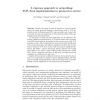Free Online Productivity Tools
i2Speak
i2Symbol
i2OCR
iTex2Img
iWeb2Print
iWeb2Shot
i2Type
iPdf2Split
iPdf2Merge
i2Bopomofo
i2Arabic
i2Style
i2Image
i2PDF
iLatex2Rtf
Sci2ools
113
click to vote
FM
2008
Springer
2008
Springer
A Rigorous Approach to Networking: TCP, from Implementation to Protocol to Service
Abstract. Despite more then 30 years of research on protocol specification, the major protocols deployed in the Internet, such as TCP, are described only in informal prose RFCs and executable code. In part this is because the scale and complexity of these protocols makes them challenging targets for formalization. In this paper we show how these difficulties can be addressed. We develop a high-level specification for TCP and the Sockets API, expressed in the HOL proof assistant, describing the byte-stream service that TCP provides to users. This complements our previous low-level specification of the protocol internals, and makes it possible for the first time to state what it means for TCP to be correct: that the protocol implements the We define a precise abstraction function between the models and validate it by testing, using verified testing infrastructure within HOL. This is a pragmatic alternative to full proof, providing reasonable confidence at a relatively low entry cost. Tog...
Related Content
| Added | 26 Oct 2010 |
| Updated | 26 Oct 2010 |
| Type | Conference |
| Year | 2008 |
| Where | FM |
| Authors | Tom Ridge, Michael Norrish, Peter Sewell |
Comments (0)

